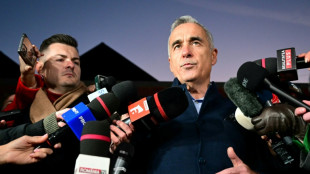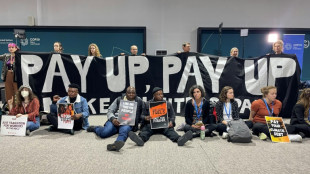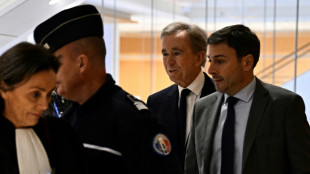
-
 Social media companies slam Australia's under-16 ban
Social media companies slam Australia's under-16 ban
-
Police fire tear gas at Georgia protesters after PM delays EU bid

-
 Canada watchdog sues Google over 'anti-competitive' ad tech
Canada watchdog sues Google over 'anti-competitive' ad tech
-
Hojlund gives Amorim winning Old Trafford bow, Roma hold Spurs

-
 Amorim wins first Man Utd home game after rollercoaster ride
Amorim wins first Man Utd home game after rollercoaster ride
-
France arrests 26 as South Asian migrant trafficking ring smashed

-
 At least 15 dead, 113 missing, in Uganda landslides
At least 15 dead, 113 missing, in Uganda landslides
-
Netanyahu threatens 'intensive war' if Hezbollah breaches fragile truce

-
 Bilbao join Lazio at Europa League summit, Chelsea cruise in Conference League
Bilbao join Lazio at Europa League summit, Chelsea cruise in Conference League
-
In Lebanon's Tyre returning residents find no water, little power

-
 Protests in Georgia after PM delays EU bid to 2028
Protests in Georgia after PM delays EU bid to 2028
-
Biden slams Trump tariff threats as 'counterproductive'

-
 TikTok tactics shake up politics in Romania
TikTok tactics shake up politics in Romania
-
'He should do comedy' says Norris of Verstappen comments

-
 Americans celebrate Thanksgiving after bitter election
Americans celebrate Thanksgiving after bitter election
-
Flood-hit Spain introduces 'climate leave' for workers

-
 UK's Starmer vows to slash net migration
UK's Starmer vows to slash net migration
-
Recount order, TikTok claims throw Romania election into chaos

-
 Jansen stars for South Africa as Sri Lanka crumble to 42 all out
Jansen stars for South Africa as Sri Lanka crumble to 42 all out
-
Bottas set for Mercedes return as Mick Schumacher quits reserve role

-
 Putin threatens Kyiv with new hypersonic missile
Putin threatens Kyiv with new hypersonic missile
-
Georgia delays EU bid until 2028 amid post-election crisis

-
 French PM announces concession in bid to end budget standoff
French PM announces concession in bid to end budget standoff
-
Guardiola's ingenuity will solve Man City crisis, says Slot

-
 South Africa in control after Sri Lanka crash to 42 all out
South Africa in control after Sri Lanka crash to 42 all out
-
'Nothing left': Flood-hit Spanish town struggles one month on

-
 Israel conducts first strike on Lebanon since ceasefire
Israel conducts first strike on Lebanon since ceasefire
-
'Unrecognisable' Mbappe and Real Madrid hurting after European woes

-
 Uber and Bolt unveil women-only service in Paris
Uber and Bolt unveil women-only service in Paris
-
French cognac workers protest China bottling plan amid tariff threat

-
 World tennis No.2 Swiatek accepts one-month doping suspension
World tennis No.2 Swiatek accepts one-month doping suspension
-
Suaalii to start for Wallabies against Ireland

-
 Farrell backs youngster Prendergast at fly-half for Aussie Test
Farrell backs youngster Prendergast at fly-half for Aussie Test
-
Suualii to start for Wallabies against Ireland

-
 Camavinga joins Real Madrid injury list
Camavinga joins Real Madrid injury list
-
Australia passes landmark social media ban for under 16s

-
 Nigerian president woos French investment on state visit
Nigerian president woos French investment on state visit
-
Contentious COP29 deal casts doubt over climate plans

-
 PSG, Real Madrid toil as giants struggle to get to grips with new Champions League
PSG, Real Madrid toil as giants struggle to get to grips with new Champions League
-
Lampard appointed manager of 'ambitious' Coventry

-
 Liberian ex-warlord Prince Johnson dies aged 72
Liberian ex-warlord Prince Johnson dies aged 72
-
K-pop band NewJeans leaves label over 'mistreatment'

-
 Sri Lanka crash to record low Test total of 42 in South Africa
Sri Lanka crash to record low Test total of 42 in South Africa
-
Putin says barrage 'response' to West-supplied missiles

-
 Lebanon MPs seek end to leadership vacuum with January presidency vote
Lebanon MPs seek end to leadership vacuum with January presidency vote
-
Eurozone stocks lift as French political stand-off eases

-
 French farmers wall off public buildings in protest over regulations
French farmers wall off public buildings in protest over regulations
-
France says ready for budget concessions to avert 'storm'

-
 Lampard appointed Coventry manager
Lampard appointed Coventry manager
-
French luxury mogul Arnault defiant at ex-spy chief trial


Einstein's risky Belgian stay after Hitler came to power
Sitting alone on a bench, legs crossed, Albert Einstein enjoys the tranquillity of a public park in the Belgian coastal resort of De Haan.
His bronze statue attracts excited tourists to the town where the famous 1921 Nobel physics laureate sojourned 90 years ago, despite a Nazi secret society putting a price to his head.
He never returned to Europe again.
It is a relatively unknown episode in the life of the American physicist of German Jewish origin, who was born in 1879 and died in 1955.
When Adolf Hitler came to power in early 1933, Einstein, a native of the southern German city of Ulm, was already teaching his theory of relativity in the United States.
Hitler's Nazi Germany swiftly hunted Jews, targeting Einstein's home near Berlin and confiscating his belongings.
On his return to Europe from across the Atlantic, Einstein landed in Belgium in March 1933 with Elsa, his second wife, fearful that returning to Germany would be too dangerous.
The physicist spent six months at De Haan under the careful watch of Belgian police.
"My mother knew Einstein well when she was young. Every morning, he walked on the promenade or on the beach," said Brigitte Hochs, a 78-year-old Belgian guiding an AFP team in the scientist's footsteps.
The Hochs family ran the Bellevue Hotel for decades, with a building in the Belle Epoque style.
The Einsteins rented one of them, the Villa Savoyarde.
- Playing violin with a queen -
Einstein would have a coffee on the hotel's terrace after his walk in the fresh air. "It was his routine," said Hochs.
She said another famous Albert, the Belgian king Albert I whose wife was a Bavarian duchess, played a large role in Einstein's short exile.
"The king strongly advised Einstein not to return to Germany," said Hochs.
Einstein knew the royal couple because he took part in congresses in Brussels. As well as the German language, he shared a love of the violin with queen Elisabeth. "They even played together," Hochs added.
The physicist's "Flemish" adventure inspired a comic last year by Belgian screenwriter Rudi Miel, who described the short exile as "a thriller", noting that Einstein was under police watch because of "death threats".
In the comic, "Le Coq-sur-Mer, 1933", referring to De Haan's French name Le Coq, Einstein, with his famously awry grey hair and thick moustache, appears as a hunted man in the drawings by Baudouin Deville.
The author imagines a blonde spy in a trench coat, pistol in hand, sent by the Nazis to kidnap Einstein as part of the Third Reich's research on the atomic bomb.
Einstein's discoveries on mass and energy from his famous equation E=mc2 laid the foundations for future nuclear fission, despite being him a pacifist all of his life.
- 'A real jackpot' -
In reality, there was never any kidnapping attempt while he was in Belgium.
But the file devoted to him in the Belgian state archives shows the extent to which Einstein was threatened during his escapades on the shores of the North Sea.
"The file is a real jackpot. Through the surveillance reports, we discover professor Einstein's personality," said archivist Filip Strubbe.
"One of the reports says he liked to walk on the promenade at 2:00 am or 3:00 am without notifying police. This made his protection difficult."
Two state security officials had to closely follow his every action because the Nazis put a price on his head.
One Nazi magazine named Einstein as an "enemy of the regime" and put a $5,000 bounty (worth more than $110,000 today) on his head.
When a Jewish researcher was shot dead in the Czech Republic in August 1933 on Nazi orders, Einstein understood he was no longer safe in Belgium.
From the Belgian port city of Ostend, he went to London from where he emigrated to the United States.
Einstein might have appreciated the many stories about his life.
The statue in De Haan is accompanied by one of his most famous quotes: "Imagination is more important than knowledge."
I.Meyer--BTB

